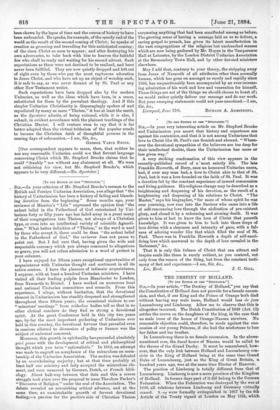[TO THE EDITOR OF THE "SPECTATOR. "] Sur,—In your criticism of
Mr. Stopford Brooke's sermon to the British and Foreign Unitarian Association, you allege that "the history of Unitarianism has been a history of fading and blanch- ing devotion from the beginning." Some months ago, your reviewer of Maurice's " Life" expressed the opinion that "the ardent belief in the Fatherhood of God entertained by Uni- tarians forty or fifty years ago has faded away in a great many of their congregations into Theism, not always of a Christian type, or even into an intellectual variety of scientific Agnosti- cism." What better definition of "Theism," as the word is used by those who accept it, there could be than " the ardent belief in the Fatherhood of God," the reviewer does not pause to point out. But I feel sure that, having given the wide and respectable currency which you always command to allegations so grave, you will not refuse admission to a word of protest in your columns.
I have enjoyed for fifteen years exceptional opportunities of acquaintance with Unitarian thought and sentiment in all its active centres. I have the pleasure of intimate acquaintance, I suppose, with at least a hundred Unitarian ministers. I have visited all their leading pulpits from Manchester to London, from Newcastle to Bristol. I have worked on numerous local and national Unitarian committees and councils. From this experience, I allege, without hesitation, that the devotional element in Unitarianism has steadily deepened and strengthened throughout these fifteen years; the occasional visitors to our "ministers' meetings" from orthodox bodies tell us that in no other clerical conclave do they find so strong a devotional spirit. At the great Conference held in this city two years ago, by-far the most important gathering of Unitarians ever held in this country, the devotional fervour that prevailed even in sessions allotted to discussion of polity or finance was the subject of universal comment.
Moreover, this growth in spirituality has proceeded absolutely pari Faun& with the development of critical and philosophical thought which you term "rationalistic." In 1866, an attempt was made to engraft an acceptance of the miraculous on mem- bership of the Unitarian Association. The motion was defeated by an overwhelming majority ; but at that time probably at least half our ministry and laity accepted the miraculous ele- ment, and were unmoved by German, Dutch, or French bibli- ology. About half-way between that date and this a severe struggle took place over the proposal to issue Theodore Parker's "Discourse of Religion " under the seal of the Association. The debate revealed an astonishing critical advance, and at the same time, an unmistakable growth of fervent devotional feeling,—a passion for the positive side of Christian Theism
surpassing anything that had been manifested among us before-. The growing sense of having a message laid on us to deliver, a saving gospel to preach, has given its latest manifestation in the vast congregations of the religious but unchurched masses which are now being gathered by Mr. Hoppe in the Temperance• Hall at Leicester, by the London District Unitarian Association at the Bermondsey Town Hall, and by other devoted ministers elsewhere.
May I add that, contrary to your theory, the stripping away from Jesus of Nazareth of all attributes other than normally human, which has gone on amongst us surely and rapidly since 1866, has unquestionably been accompanied by an ever-increas- ing admiration of his work and love and veneration for himself.. These things are not of the things we should choose to boast of; we would rather quietly deliver our message and do our work. But your sweeping statements could not pass unnoticed.—I am, Sir, &c.,


































 Previous page
Previous page